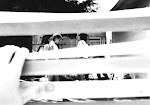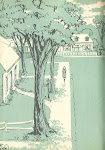In five years of working at a Jewish-sponsored university, I've learned that two things are taken very, very seriously: kosher food laws, and holidays/Sabbaths. April and September-October bring days off -- some years, like this year, a lot of them.
I tend to spend these bonus days doing research. During Passover I shut myself up at the UNLV library, listening to oral histories (on a tape recorder!) and going through archives of the Sun and the Review Journal. Neither newspaper is indexed, so I had to read them page by page, which was extremely distracting (pause to see how different "Rex Morgan, MD" was in 1964 (not very)...pause to read prices of stereos and Danish Modern furniture...pause to consider a picture of LBJ and Khrushchev in fake Beatles wigs.) I think I got through about 2 weeks of February 1964, all told.
I started this set of holidays by going to the Museum of Atomic Testing. Atomic testing is emerging, maybe, as a motif in the book. It opens with one of my protagonists remembering watching atomic tests from the playground of her elementary school, and the other protagonist has a father who works at the Test Site. It's an interesting museum, combining serious information with some atomic kitsch. (The old "Duck and Cover" movie is played.) I noticed that the sections devoted to the later underground tests attracted much less attention from the visitors. I tried to look at everything, though I didn't find much information on workers at the site. (There's also a reading room and a public archive, which I might go back to later if I have more specific questions.)
There's a fine line with research. Too much can drag you down, quell the imagination. But finding that odd gem of a detail gives the book authenticity. When I come away from the research library, heavy-headed and a little sleepy, I'm usually aware that somewhere in my notebook is something that will lead me in a direction I never thought of.
Friday, September 30, 2011
Friday, September 9, 2011
I was watching Mr. Rogers.
In the past couple of days the where-were-you-when-it-happened stories have swept over me. I didn't want to join in. I find it painful to talk about 9/11, and it's sometimes strange to me that no one else finds it so painful they won't talk about it. Perhaps I'm still at that stage of grief when you just try to go on, day to day.
So I'll say it. I had a three-year-old at the time and as soon as I got up I put Mr. Rogers on. I never watched the news in the morning then. Now, I watch the news every morning, ever since, and I've learned to recognize that tone in the announcer's voice that means, something very, very bad has happened. Then the phone rang.
We'd left New York six months before. My husband was born and raised there and it was my adopted city, where I went to college, lived and worked. In all that, I never went to the World Trade Center. I never had to. Didn't have business there and wasn't a tourist interested in the view.
But the World Trade Center was the modern city. There's a video -- a very primitive, early video -- for the Blondie song "Heart of Glass," which basically shows the band, playing on Saturday Night Live, intercut with shots of the World Trade Center and the Manhattan skyline. The Trade Center was the city, for those who came to it in the bad years and lived through them. It wasn't the past, like the Empire State Building. It was our city, the one we had trekked to.
My one thought, out in Las Vegas, was I should have been there. I should have gone through it with my city. I wasn't glad I had escaped -- I felt guilty.
The towers have never meant to me what they seem to mean for other people. I don't think of "first responders." (A horrible coinage.) Or freedom, that being a word that is so twisted around sometimes I don't recognize it. I take nothing away from the people for whom it does mean those things. We all have our own experiences of grief and our own methods of dealing with it.
This Sunday the streets of my town will be filled with people running a triathalon in honor of September 11. Running/biking/swimming is great, especially when do it for your own health. But part of me wonders how running a triathalon does anything for the dead. (Or the "fallen" -- another new coinage.)
After 9/11 my church orchestra got together, learned, over several weeks, Faure's Requiem, and, on a certain Sunday, performed it for the congregation. I remember listening to it, hearing the words, "Lord, give them peace, give them peace." And I thought, it's not peace for them we want. It's peace for us.
In the past couple of days the where-were-you-when-it-happened stories have swept over me. I didn't want to join in. I find it painful to talk about 9/11, and it's sometimes strange to me that no one else finds it so painful they won't talk about it. Perhaps I'm still at that stage of grief when you just try to go on, day to day.
So I'll say it. I had a three-year-old at the time and as soon as I got up I put Mr. Rogers on. I never watched the news in the morning then. Now, I watch the news every morning, ever since, and I've learned to recognize that tone in the announcer's voice that means, something very, very bad has happened. Then the phone rang.
We'd left New York six months before. My husband was born and raised there and it was my adopted city, where I went to college, lived and worked. In all that, I never went to the World Trade Center. I never had to. Didn't have business there and wasn't a tourist interested in the view.
But the World Trade Center was the modern city. There's a video -- a very primitive, early video -- for the Blondie song "Heart of Glass," which basically shows the band, playing on Saturday Night Live, intercut with shots of the World Trade Center and the Manhattan skyline. The Trade Center was the city, for those who came to it in the bad years and lived through them. It wasn't the past, like the Empire State Building. It was our city, the one we had trekked to.
My one thought, out in Las Vegas, was I should have been there. I should have gone through it with my city. I wasn't glad I had escaped -- I felt guilty.
The towers have never meant to me what they seem to mean for other people. I don't think of "first responders." (A horrible coinage.) Or freedom, that being a word that is so twisted around sometimes I don't recognize it. I take nothing away from the people for whom it does mean those things. We all have our own experiences of grief and our own methods of dealing with it.
This Sunday the streets of my town will be filled with people running a triathalon in honor of September 11. Running/biking/swimming is great, especially when do it for your own health. But part of me wonders how running a triathalon does anything for the dead. (Or the "fallen" -- another new coinage.)
After 9/11 my church orchestra got together, learned, over several weeks, Faure's Requiem, and, on a certain Sunday, performed it for the congregation. I remember listening to it, hearing the words, "Lord, give them peace, give them peace." And I thought, it's not peace for them we want. It's peace for us.
Subscribe to:
Posts (Atom)







